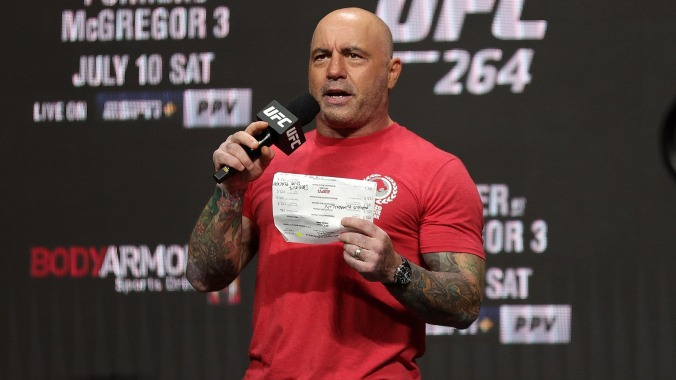“I think there’s a lot of people who have a distorted perception of what I do, maybe based on sound bites or based on headlines of articles that are disparaging. The podcast has been accused of spreading dangerous misinformation,” Rogan said in the video posted to Instagram, before also saying that the backlash comes from two specific episodes, “one with Dr. Peter McCullough and one with Dr. Robert Malone.”
“Both these people are very highly credentialed, very intelligent, very accomplished people and they have an opinion that’s different from the mainstream narrative,” Rogan continued. “I wanted to hear what their opinion is. I had them on and because of that, those episodes in particular—those episodes were labeled as being dangerous, they had dangerous misinformation in them.”
“The problem I have with the term misinformation, especially today, is that many of the things that we thought of as misinformation in just a short while ago are now accepted as fact,” he added. “Like, for instance, eight months ago, if you said ‘if you get vaccinated, you can still catch COVID and you can still spread COVID,’ you would be removed from social media. They would ban you from certain platforms. Now, that’s accepted as fact. If you said ‘I don’t think cloth masks work’ you would be banned from social media. Now, that’s openly and repeatedly stated on CNN. If you said ‘I think it’s possible that COVID-19 came from a lab’ you’d be banned from many social media platforms. Now, that’s on the cover of Newsweek.”
However, some of the claims Rogan highlighted are still examples of COVID-19 misinformation. For example, though Newsweek reported that the World Health Organization (WHO) said a Wuhan lab employee “who was infected in the field [by a bat] by taking samples falls under one of the probable hypotheses,” a closer reading finds that “WHO experts could not find direct evidence to support the theory that the pandemic stemmed from Wuhan bat research.” Not completely ruling out a theory is not the same as having proof that COVID’s origins come from a lab.
Rogan also said he’s “very sorry” that Neil Young and Joni Mitchell felt the need to remove their music, as he’s a fan of Young’s. “No hard feelings,” he told them.
Additionally, the podcast host explained that he’s in favor of Spotify adding a disclaimer at the start of COVID-related podcast episodes, saying, “One thing that Spotify wants to do that I agree with, is that at the beginning of these controversial podcasts, specifically ones about COVID, is to put a disclaimer and say that you should speak with your physician and that the opinions that [these people] express are contrary to the opinions of the consensus of experts, which I think is very important.”

 Keep scrolling for more great stories.
Keep scrolling for more great stories.
